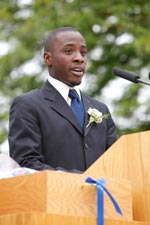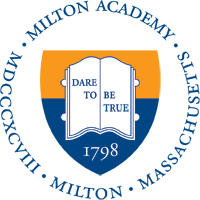Graduation 2009
“For last year’s words belong to last year’s language and next year’s words await another voice. And to make an end is to make a beginning.” – T.S. Eliot, Class of 1906
Family, faculty and friends stood witness as members of the Class of 2009 made an end to their time at Milton Academy during the School’s 210th graduation exercises on Friday, June 5. Seniors began the morning’s festivities with a traditional procession around campus, bidding farewell to underclassmen at each of the eight houses. With flowers in hand, the graduating class made its way to the formal ceremony on the lawn outside Apthorp Chapel. Elected by Milton’s seniors to speak on their behalf, Chloe Cole and Matthew Trammell addressed the audience. Alumnae Erika Mobley ’86—who leads business development and licensing for Apple’s App Store—delivered the commencement address.
Speech by Chloe Cole '09
Acting like a typical senior in senior spring, I was in complete denial about being valedictorian until a dinner with my parents a week ago. They told me I should consider working harder on my speech since, as my father kindly told me, all of my classmates would remember what I said, word for word, for the rest of their lives. While my parents calmly continued their meals, I quietly suffered from a minor nervous breakdown. One glance at my face gave it away to my mom. Her response was to laugh hysterically.
Finally, I decided to begin work on my speech. I tried to focus on one goal. After much thought, I figured out what my goal was. It was lofty, but I thought with hard work I could achieve it: My goal was to make my mom laugh.
My mother has the most satisfying laugh. She actually makes very little noise. She stops breathing, turns very red in the face, and can’t speak though she tries endlessly to articulate what is so funny. She sounds something like this: (impression)
Thinking about my goal, I started to ponder why laughter, hearing someone laugh or laughing yourself, is so fulfilling and cathartic.
The Class of 2009 obviously enjoys the sensation as much as I do, because classmates repeatedly asked me to make my speech funny. I think my classmates recognized that a speech that did not include humor would not accurately reflect our class, would not do our class justice. After all, at the end of our freshman year, Mr. Fitz and Mrs. Brewer told our class what made us unique and memorable was our sense of humor and how it permeated every activity we did together.
Indicative of our appreciation for a good laugh, when I asked different individuals for memories of our class, everyone fed me hilarious ones. Several students told me to include this year’s Community Service Day when Gemma Soldati, wearing high-waisted pink shorts, serenaded our class with “Do you really want to hurt me?” Another group of students demanded I relay to the audience how unfailingly Connor Handy argued freshman year against day students’ right to use the waffle maker at breakfast. A few students wanted me to describe how, after our class realized we weren’t going to have senior skip day, Sarah Diamond wrote to the conference with ideas for new senior days we could have. Different ideas on the list were: Senior Unibrow Day, Senior Bring Your Child to School Day, Senior Bring Your Puppet to School Day, Senior Loin Cloth Day, Senior Leave the Country Day, Senior Switch Ethnicity/Gender Day, and the best: Senior Pick on a Freshman Day. And, of course, everyone wanted me to include any story involving George Haydock.
In general, Milton Academy is a community where humor is greatly valued. Ask any student about the two school newspapers, and he will most likely deliver a diatribe in which he focuses on which paper has the best humor back page. The Improv course’s show in the fall was so crowded, I believe the parents of students in the class had to sit on the laps of students to get a seat. And the biggest joke of all: The science department believed it could teach me the concept of scientific notation. I just want to give a big shout out to Mr. Gagnon for trying to make that one happen. Nice try. The Milton website even asks prospective students: “Do you like to laugh? Can you laugh at yourself?” If you can’t laugh at yourself, I promise other people can do it for you at Milton. I mean that in the best way possible. I truly do.
One specific story I can share that still makes me laugh and best illustrates our class’s personality is Man Band. Man Band was born one weekday morning when Mr. Feldman challenged our class to provide impromptu entertainment. A group of boys took the stage. That group included Connor Handy, Wyatt Cmar, Joe Jonas (I mean, Mike Baldino), Mike Saltzman, Chris Sperandio and Kyle Mountain. Kyle left our class after sophomore year to, as it was rumored, join the NHL, a career path I too hope to follow after high school. These five boys—no, men—took the stage and jokingly threatened to perform some impromptu a cappella. The joke ended, however, when Chris Sperandio was able to accurately remember all the lyrics to “Afternoon Delight,” lyrics that include the following lines: Rubbin’ sticks and stones together makes the sparks ignite, and the thought of rubbin’ you is getting so exciting. Chris proceeded to perform a solo for us—to our delight.
The next week Man Band made its first performance for our class a cappella…with guitar by Wyatt Cmar. When I discussed Man Band with Ben N-H, he remarked the funniest thing about Man Band was the singing was “actually good.” The boys of Man Band represent how our grade can accomplish something great while keeping a sense of humor. We showed this same attitude with the hilarious but harmless pranks we as a class (but really Douglon Tse) accomplished this year. Following our final prank, Matthew Trammell told me he felt bad for the Class of 2010 for having to follow such a great act. It’s true. My advice, though, to the rising seniors is learn to laugh.
After all, being perpetually serious does not mean you are intelligent. The ability to take a step back and analyze yourself in a humorous light is valuable. It means you can look in retrospect at your actions and critique your rationality without bias. This ability assures you will make better decisions in the future. Humor can also be used to defend yourself from depression when you are tested. You can also use humor to communicate with others and grow closer to other individuals, as our class has over the past four years. It can be used to satirize injustices and express opinions and outrage when it is difficult to do so openly and bluntly. In the preface of “Black Comedy,” a collection of humorous plays, Thomas W. Jones II wrote, “To laugh is to diffuse the powerful rage burning beneath the soul.”
Susan Marianelli always says: “I would rather laugh than cry. If I cry I have to carry Kleenex and I have too much to carry already.” As someone less famous, Bill Cosby, once said, “You can turn painful situations around through laughter. If you can find humor in anything, even in poverty, you can survive it.” Cosby’s quotation brings up an interesting complexity with humor. I think what’s important to recognize about our class’s sense of humor was that it did not reflect a lack of depth or understanding. Instead, as shown well by our carefully planned pranks, our class perceived the serious qualities of life at Milton, like stress, homesickness, disappointment, responsibility, but we chose to focus on the brighter side of life and remembered to put energy into making each other laugh. Plus, studies have shown that if you don’t laugh, you’re not going to experience success. I’m just kidding. Not really. No, I am. But, seriously, in this economy, you are probably not going to get a job for a while, so laugh because what else can you do?
To the classes of 2010, 2011 and 2012, a sense of humor will help you through Milton. The time humor will heal your wounds is that night when you’re up at 2 a.m., studying for a quiz on cell structure or Megablunders and you suddenly realize how stressed you are about something so relatively trivial, and you start laughing hysterically. Let it happen. It’s a perfectly normal response. It shows you’re still healthy. Even my cool buddy William A. Ward once said, “A well-developed sense of humor is the pole that adds balance to your steps as you walk the tightrope of life.”
To the members of the Class of 2009, as we move on, we remember all the time we had together. And as our lives change, come whatever. We will still be friends forever. Yes, those were lyrics from Vitamin C’s classic song, “Graduation.” I thought they would be appropriate.
But seriously, being a part of the Class of 2009 taught me to embrace silliness, and I will never forget that, no matter how serious and grown up I think I have become.
Parents, relatives and friends, you probably don’t know and don’t want to know all the hilarious things your special student did at Milton, but know he helped to make the past four years upbeat and unforgettable for his classmates and for me. Thank you.
Speech by Erika Mobley '86
Thanks very much to the class of 2009 for inviting me here today. I will do my best to keep things interesting because I know from experience that hearing even this much gives you hope that this might, in fact, be interesting, while also giving me a better shot at holding your attention for just a little while.
I confess, I thought about making my speech a required app download from our iTunes App Store. Not only would this have made my role here easy, but it would also give my company a big sales spike in the Boston area. In case you’re wondering, I decided otherwise, so no…. there is NOT an app for that.
I will pretend that it wasn’t that long ago that I was sitting where you’re sitting and feeling how you probably now feel: excited, distracted, joyful and anxious all at once. You’re trying to focus but barely listening with so much going on today that’s competing for your time and attention. What’s worse, there is also technology to compete with: you’re able to SMS and “Twitter” your friends right now or silently don those ubiquitous white earbuds to tune things out. The ones made, rather ironically, by the very company I work for!
In considering what I wanted to say to you today, I realized that the “10 things you should know” speech model really only comes off if you’re famous. According to my mother—and only to my mother—I am “almost famous” so permit me just three pieces of advice from my own experience. If that still sounds untenable, think of this entire speech as roughly the equivalent duration of four 5MB digital song downloads—LEGAL ones—before you’re free to go.
#1: Don’t buy into formulas [for living your life] too quickly or too easily. Bottom line, there is more than one way to go about doing what you want in life. I’m a firm believer in this probably because I’ve lived it. To this end, I need to come clean: I lied to you. I am not an attorney. Well, not in the traditional sense of the profession if you’re imaging a trial defense lawyer or corporate law firm partner. I went to law school, took the Bar, passed it, and completely defied the then-unwritten rule that my next choice was to teach law or become an associate at a law firm.
I am a lawyer if you want to be technical, and I needed to be technical to have a concise title to put down on the commencement invitation. But I’m not one for titles, and I’ve struggled to classify myself into any one of them throughout my life.
I work for Apple and have worn several hats utilizing my legal background in my many years there, but I have never been in the legal department, and this works just fine for me. While I do appreciate knowing how to draft and analyze an iron-clad agreement, I also like the creative side of crafting business deals from square one.
Presently, I oversee the App Store business, managing our strategy and negotiations with music labels, film studios and TV networks developing apps for the iPhone and iPod touch. For most of my professional life I’ve worked in high-tech startups like Palm, RealNetworks, and Amazon.com. They’re all different companies that have one shared standard: no rulebook. No handbook or reference manual on how to invent what we’re doing tomorrow, and how any of what we’re doing today may play out ten years from now. Of course, there are pros and cons to this. The job is challenging and demands longs days and hard work, but I enjoy that it’s something a little unconventional.
My difficulty with formulas dates back to school days.
I came to Milton as a day student in Class III and was lucky enough to call it “home.” And I do mean “home.” As a day student, I was often confused for a boarder because of my love of on-campus activities and frequent use of Hathaway House and Goodwin, (yes, I know that’s dating me) and particularly during track season.
Academically, creative writing and English courses with my advisor J.C. Smith were fun and came naturally to me. In Spanish, I aced the “ser versus estar” use case, but when it came to subjects like science or math, life was brutal. And, it seemed, remedial.
My closest friends were always one course ahead of me. When I was taking Algebra, they had Algebra 2. They told me how “easy” I’d find Geometry, but when I took it the following year, I was ready to hit my head against the wall over the Pythagorean theory and “proofs.”
I played the saxophone in the orchestra alongside many talented, classically trained musicians. Not surprisingly, the likes of Brahms, Mendelssohn and Bartok didn’t exactly compose prolifically for an e-flat alto sax, so I had a good amount of time between notes to tap my foot on beat and relish how offbeat it was to play Romanian Folk Dances on sax, yet fun just the same.
The point wasn’t how often I played, but that it was considered okay, even cool, at Milton for someone who wants to play sax in the classical orchestra or be a day student with a boarder’s mentality.
At Yale, I enjoyed the ritual known as “shopping period”—a week-long open house at the start of each semester that let you “try before you buy,” so to speak. You could sit in on as many classes as you wished without hemming yourself into one area too quickly. This encouraged me to test-drive courses I wouldn’t otherwise dare register for sight unseen. To this day, I can thank shopping period for my love of history of architecture and appreciation for quirky comedic Russian plays by Gogol.
I settled into a major I enjoyed: American Studies/Literature.
Still, two years into college, I had a stronger grasp of what I did NOT want to do rather than what I did.
I watched as some classmates naturally gravitated toward known talents and interests, but I stubbornly resisted the idea that after 20 years of great inter-disciplinary education, it all had to boil down to one defining choice. It wasn’t that I didn’t like anything. I liked too many things to narrow the choices. When I finally decided to go to law school, people would usually ask whether I’d majored in political science. “No, I’m an English major,” I’d respond. This usually prompted a reply like “you’re supposed to major in poly sci if you want to go to law school.”
I did go to law school and did not switch my major to accommodate the common theory. And in law school, I came to two realizations rather quickly: One, that I valued understanding our legal system for my own practical application. And two, that I did NOT want to be a lawyer. At least not in the conventional sense of what we all define a lawyer to be. Don’t get me wrong: I was happy for classmates who landed lofty law firm gigs with lots of perks and high salaries. I still knew this pattern wasn’t for me.
I researched options for someone who wanted to apply law into something a little more unique. Timing, luck, and a great deal of hard work led me to a part-time job at the Recording Industry Association of America (RIAA) while in law school, seeding an interest on international anti-piracy, law and digital technology. When I graduated and passed the Bar, I opted to pursue this path. It was a fairly new area at the time, but that’s partly why I gravitated toward it. It defied definition.
Who would have known, least of all me, that my first job out of law school would be working on international anti-piracy concerns for the RIAA, traveling to far away places like Brazil and Paraguay to oversee trade and enforcement talks with U.S. and foreign diplomatic officials, and even traveling with members of FBI anti-narcotics team who were newly tasked with relieving the spread of global intellectual property piracy affecting the worldwide movie, music and software industries.
I never looked forward to the formulaic path that others choose for me, and I’ve never looked back on what I have done with regret.
It’s easy for any of us to get wrapped up in anxiety that everyone else has things all figured out, and you’re the one off course.
Stay in your own lane. And while you can’t do everything, of course, don’t lose sight of the things you really love doing.
This brings me to point number two of three. (Yes, you’re nearly there.)
#2: Don’t downplay your own experiences and don’t forget what you already know.My early experience at RIAA led me next to a new challenge out West at the start of the dot com/high tech era.
By then, I’d gotten pretty good at understanding the business issues, but craved a deeper technical knowledge of the industry. The problem was my mental block on anything outside liberal arts. It brought me back to my Milton days of needing a tutor to learn C-code and DOS. It was daunting. And it didn’t help matters that there were few female colleagues or mentors, and virtually no one of color.
Day after day, I’d often sit among teams of brilliant engineers speaking their brilliant engineering speak. I was very interested in the intricacies of all they knew about streaming media technologies, but more than a little intimidated by their vaster knowledge in these areas. I remember being in a meeting one day about simultaneous multiple integrated language or SMIL, as we all affectionately know it, of course. Terms like Secure Socket Layer and X code were being bandied about by my colleagues as if they were normal “how’s the weather?” parlance.
Then it clicked. I had always felt slightly intimidated viewing them as engineers because I didn’t “speak the language,” yet I was always good at learning new languages in school since that was an interest of mine. If I could just shift my mindset to the idea that this was, in essence, a new foreign language, I would excel in understanding any concept or terminology that surfaced in this new industry. It worked. For me, anyway, to the extent I have thus far.
My point? Don’t forget the skill sets you possess. There will be many titles and positions you’ll pave your own way into one day. Just don’t expect the path to always go smoothly. As a lawyer, it was no easy task in my early job interviews to prove to hiring managers that I was capable of taking on business roles.
Recruiters were often dismayed that I didn’t conform to their standard model of what they were looking for. It’s as if the entirety of my interests and experience leading up to that point fell away at the moment I was granted a law degree.
The first position I saw in the emerging dot com world required background in the music industry, marketing and analytical skills, all of which I had. But all they saw were the letters J.D. at the end of my name. “Oh, but you’re a LAWYER!” said the job recruiter somewhat ruefully. “Sorry, then this won’t apply to you.”
I had to convince people that a law degree was a valuable asset, not a deficit. I realized the challenge wasn’t really about my J.D. lacking inherent value, it was that it defied most people’s expectations of what a law degree equated to in the job market.
You may find these heightened expectations yourself in whatever you pursue. Be open, even welcoming to doing things in an unconventional way.
#3: Move out of your comfort zone. Be adaptable and open to paraphrase. Exactly one year ago today (June 5, 2008) I was completing a two-year international job assignment running the iTunes Store for Australia and New Zealand, living in Sydney and enjoying a wonderful existence working Down Under as the sole American among my team of Aussies and Kiwis in our regional office.
I didn’t know exactly what role I’d have upon my return to Apple headquarters; my previous post had been filled when I left for Australia. But I knew I wanted to look to whatever the next big challenge was facing our industry, and apply my experiences to date.
I realize it’s hard for any of you to say exactly where you will all be or what you will be doing in four years after college or more after graduate school. The world today is a funny place, and I don’t mean in the “ha ha” sense lately. Long-established companies that were once fixtures of our society are gone. The economy is in a free fall, gas prices are at their highest levels, and thanks to congestion in the air and a burning atmosphere, we’ll all need SPF 150 soon as the ozone layer falls from the sky.
Of course, this is a notably challenging time, and I don’t mean to downplay that reality, but I do feel we all tend to get sucked into the void of crisis and overlook that it is precisely intimes of crisis when some of the best new ways forward are realized.
I will only remind you that in 1986 when I graduated, there was no such thing as FaceBook, and if you “poked” someone you’d get the wrath of the Disciplinary Committee, not an enthusiastic response from your friends on that social network. There was no Amazon.com and Google wasn’t a noun or a verb. Worms and viruses were things to avoid at summer camp, not idle threats to your corporation.
The host of companies that now reign today barely existed. Blackberries, Blu-ray and Apple were not the norm.
Nor were color-coded social causes: no RED or PINK campaign at large, and no promise of Green technology. The world seemed fixed in black and white, and so did the choices of what we were all to accomplish. Today things seem much grayer.
But while things look grim and dreary out there in the world ahead, know that you’re at the helm of a new era and some of you will lead us down the path of whatever the next big thing is.
You now have a great degree from a highly sought after academic institution, and you’re all going on to great places. Understand, this does not guarantee you many entitlements. But with hard work, and the right mindset, smart people like you can accomplish anything.
Break that association between what you think you should do for others, and what you really want to do for yourself. You have to be honest with yourself about what you enjoy doing versus what you would do in life only because it makes the most money or sounds best at social functions. I once read, “If you are not genuinely honest with yourself, you can’t learn, and if you worry about what others think of you, you will be living their version of your life and not yours.”
I hope you’ll leave part of yourself receptive to the idea of change; while it can be scary, it is also exciting to know that the world is a clean slate, limited only by your ability to innovate and adapt. Congratulations, and my very best to you all for the future.
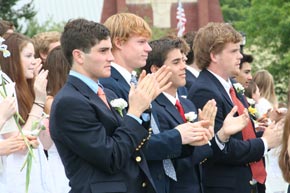

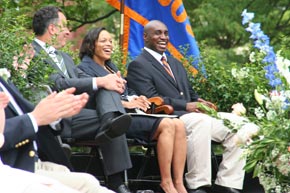
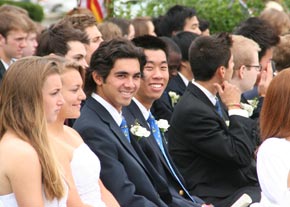
Graduation Speakers
Erika Mobley ’86

Rick Hardy, Head of School
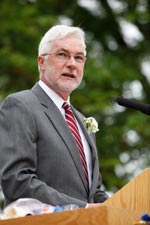
Chloe Cole ’09

Matthew Trammell ’09
